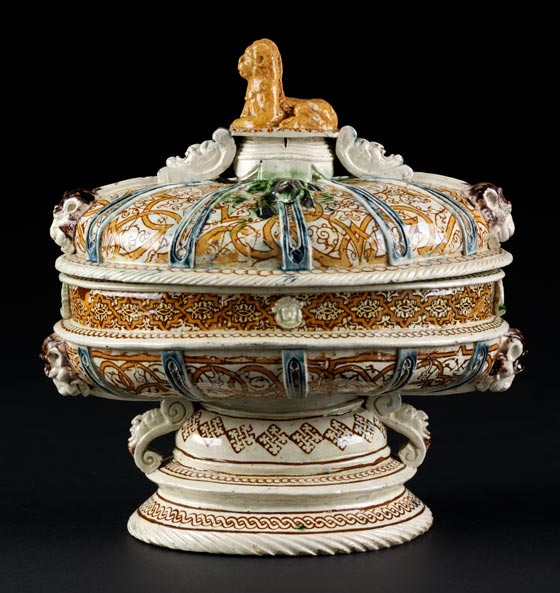
BERNARD PALISSY,
THE HUGUENOT POTTER
IN a quiet little town in the south of France, more than three hundred and fifty years ago, was passed the early life of Bernard Palissy. His parents were poor, and he had no school advantages; but he was a bright, active boy, and by some means he learned to read and write, and also to paint portraits on glass, and to measure land.
When a youth he left his home, and after traveling through different parts of France he settled in the town of Saintes. Here he advertised himself as a painter and land surveyor, but obtained little employment, and remained very poor.
One day he chanced to see some specimens of ancient pottery, among which was an enameled cup of great beauty. He looked at it with admiration. No man in France could make the enamel to which that cup owed its beauty. Palissy knew nothing of pottery, but he determined to discover the secret of the wonderful enamel.
He immediately began to make experiments, and for seven long years continued his efforts, in the midst of privation, hardships, and repeated failures. At length he succeeded in producing the enamel, and, after eight years more, he established a pottery, which became famous throughout France.
From childhood, Palissy had studied the beautiful things of the woods and fields, and now he delighted in reproducing leaves and flower?, birds, butterflies, and even reptiles, in all their brightness of color and elegance of form. His work was highly prized, and he was often employed by the nobility in making various ornaments for the decoration of their palaces. Palissy was a Protestant, in France called a Huguenot. He loved the word of God, and endeavored to obey its teachings. An innkeeper named Victor was also a Protestant, and the two friends met every week to study the Scriptures together. After a while they invited their neighbors to join them, and many gladly listened to the message of divine truth. But they were not long to enjoy these privileges. A new king, Francis II., had ascended the throne, and one of his first edicts commanded that all should be burned at the stake who would not give up their precious Bibles and return to the Catholic church. Palissy continued to preach, and openly to declare himself a Protestant, but for a time his genius secured him from persecution. Finally he was arrested and committed to prison. His captors determined to remove him secretly to Bordeaux, where he would be beyond the protection of his powerful friends.
Victor the inn-keeper, suspecting this design, was waiting near the prison door at evening when he heard the sound of hoofs, and saw a small troop of horsemen approach the gate. It was opened, and a muffled form led out. Victor sang with a careless air a tune, which they had often sung together. He was answered by a shrill whistle. Then he knew that they were taking his friend to Bordeaux, and that no earthly power could save him but the king of France. Victor hastened to the nobleman who had befriended Palissy. The nobleman hastened to the queen. She was about to build a new palace, and being informed of the good potter's skill she obtained his release.
He soon after went to Paris, where for some years his life was one of great prosperity. Here he made important discoveries, and published several scientific books.
At the time of the massacre of St. Bartholomew, Palissy, then upwards of eighty years of age, was sent to the Bastile, from which he hourly expected to be led to the scaffold or the stake. The king was unwilling to see him put to death, and tried to induce him to renounce his faith, but in vain. His answer was, "I am ready to yield up my life for the glory of God.
Those who compel you, a king, have no power over me; for I know how to die."
But he was not put to death. Four years he remained in the gloomy prison, and then God himself released him. He had been faithful to his Master here, and a glorious reward awaits him hereafter.
Though not faultless, the character of Bernard Palissy was a noble one. We think the secret of his greatness may be found in these cardinal principles of his life: To persevere in his undertakings, and overcome difficulties, instead of yielding to them; to make use of every opportunity for improvement; to do his best in everything, no matter how insignificant the work might be; and, most important of all, to be
true to his convictions of right at all times, and under all circumstances.

M. A. D.